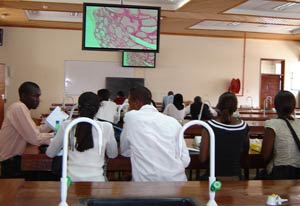USAID devotes $12m to bolster higher education in Africa
November/December 2010 | Volume 9, Issue 6
USAID is devoting about $12 million to bolster higher education in Africa through capacity building partnerships designed to nurture local expertise in critical development issues such as health, food security and natural resource management. The initiative will pair 11 African universities with U.S. partners.

Photo courtesy of Dr. James Kiarie
USAID will support higher education programs throughout
Africa, including at University of Nairobi, where students
are pictured above attending classes.
The program is intended to maximize the resources of U.S. institutions while placing African universities in the lead to capitalize on their on-the-ground knowledge, proximity to the challenges, and build their own capacity to better address these challenges.
"The citizens, academics, and civic and educational institutions of developing countries must be integrated into the way we partner to address development challenges," said USAID Deputy Assistant Administrator for Africa Franklin Moore. "In this way, we can ensure that projects are sustainable, reflect decades of lessons learned, are maximally effective and targeted, and help to build in-country capacity to solve development challenges. Universities are among the most important parts of civil society, and their engagement in policy and program design and implementation is critically important."
The partnerships have detailed five-year strategic plans with a 10-year vision to address national and regional development priorities in sub-Saharan Africa through higher education human and institutional capacity development. Funded by USAID through a grant to Higher Education for Development, the partnerships are the result of the Africa-U.S. Higher Education Initiative, a collaborative effort started in 2007 to advocate for increased engagement in African higher education capacity development.
Several of the projects will focus on infectious diseases and five of the African institutions are also involved in the Medical Education Partnership Awards, being jointly administered by Fogarty and the Health Resources and Services Administration. They include Addis Ababa University in Ethiopia; University of Nairobi in Kenya; University of Capetown in South Africa; Makerere University in Uganda; and University of Malawi.
More Information
To view Adobe PDF files,
download current, free accessible plug-ins from Adobe's website.